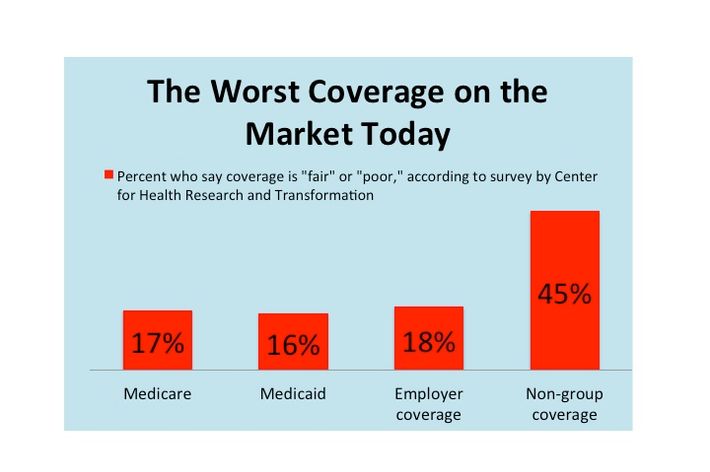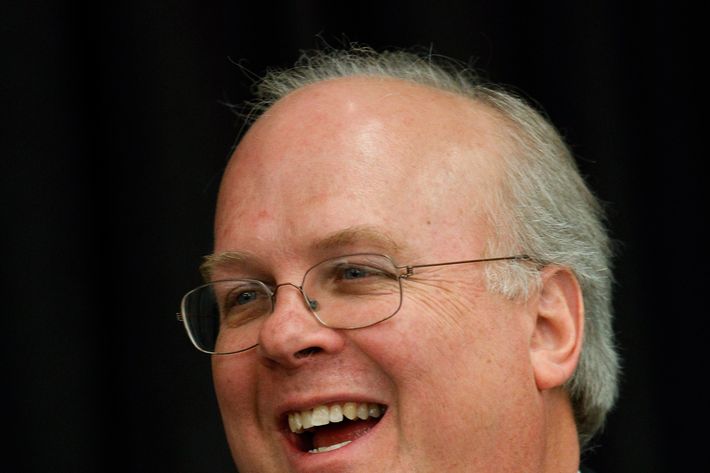
The keep-your-plan fiasco, in addition to flummoxing Democrats, has not only held out to Republicans the tantalizing prospect that they can discredit and defeat Obamacare, but also drawn into sympathetic focus their own alternative vision.
Here is the basic ideological division. Obama wants the health-care system to do more to pool risk — which is to say, to shift the burden of covering the sick onto the healthy. Republicans want it to do less to pool risk, so that healthy people can be free of the burden of subsidizing the costs of those less medically fortunate.
The small portion of the populace that lies outside of either employer-based or direct government coverage provides the closest existing model for the health-care system conservatives favor. The minority within this market who have insurance, and are losing their plans as a result of regulations preventing insurers from excluding the sick, have dominated public attention and formed what conservatives imagine will be a constituency for their own brand of counter-reform: a deregulated market where healthy people can buy cheap, bare-bones plans, and sicker people have to pay large out-of-pocket costs. Obamacare’s torturous birth pangs have convinced giddy conservatives that they are on the cusp of a great ideological victory.
The Wall Street Journal editorial page urges Republicans to “revitalize and improve the old individual insurance market.” A Journal column by Ramesh Ponnuru and influential Republican adviser Yuval Levin lays out a plan along these lines in more detail. Matt Lewis in the Daily Caller predicts triumphantly that Obamacare’s struggles can open the door for Republicans to seize away from Democrats the advantage on health care. Tasting Obamacare blood, conservatives are now seizing the offensive.
The Republicans’ triumphant plan for ideological conquest ignores some massive obstacles. The first is that, while people with individual insurance may not like the prospect of losing their plan with no easily obtainable alternative, people with employer-based insurance like the prospect of losing their plan a lot less. Conservatives propose to cap the tax deduction for employer-based insurance. That, Ponnuru and Levin write, would “make employees more cost-conscious; and competition for their favor would make insurance cheaper.” That sounds nice in theory. In reality, it means squeezing not millions but tens of millions of happily insured workers into skimpier plans, or plans with higher premiums, or onto the individual market. The scale of the disruption from that one change alone would dwarf the “keep your plan” complaints.
Second, conservatives may prefer an individualized market where healthy people get cheap, bare-bones insurance. But Americans overwhelmingly prefer more comprehensive insurance. Employer-based insurance, which charges young, healthy workers the exact same rate as older, sicker ones, is the most redistributive form of insurance, and also the most popular kind by far:

The Republican plan is to move as many people as possible from the kind of insurance they like to the kind of insurance they hate. Obama’s plan is to make unpopular individual health insurance more like the popular employer-based health insurance, with lots of cross-subsidies from healthy to sick. The conservative plans propose to make popular employer insurance more like the unpopular individual market.
The right’s dilemma grows more acute when you move from the general to the particular. Their argument is that Obama forces healthy people to pay higher premiums to pay for a bunch of crap they don’t want or need. Karl Rove argues in his Wall Street Journal column that Obamacare forces people to pay for “expensive and often unnecessary provisions.” And what provisions are these? Where is the medical equivalent of Bridge to Nowhere or scientific research on animals that Republicans love to mock? The problem turns out to be a requirement that “every policy offer a wide range of benefits including mental health and addiction treatment, and maternity care (even for single men or women past childbearing age), and cover 100% of the cost of an array of preventive services.”
This is a morally bizarre conception of what health insurance means. Most of us don’t need mental-health or addiction treatment. Some of us do. Some of us who don’t currently need mental-health treatment might potentially need it one day. You could have a system in which only people who need mental-health treatment pay for mental-health insurance, but then it wouldn’t be insurance anymore. It would be a system in which you pay for a doctor out of pocket.

More comical still is Rove’s denunciation of the Obamacare requirement that insurance provide free preventative services. Here’s the list of preventative services covered under the law. It’s a bunch of screening tests and vaccines. These things may not completely pay for themselves, but they’re highly cost-effective – a small, cheap early intervention can often prevent a costly, painful one later. The Department of Health and Human Resources estimates they would add 1.5 percent to the cost of premiums. Is that an outrageous sum to prevent a fair amount of pain and suffering?
I suppose one could, if inclined toward a certain libertarian mind-set, defend on moral grounds Rove’s belief that mothers alone should bear the cost of giving birth, rather than forcing the rest of us to foot the bill. But is this an argument Republicans have any chance of winning? Their plan is literally to run against motherhood.
The final, and deepest, mistake of the right’s triumphalism is to mistake a fear of change for an affinity for the kind of change they’re proposing. Our broken health-care system has taught Americans to associate change with change for the worse. The system resists change because even tiny groups of beneficiaries cling to the status quo. Fear of change has been the right’s most powerful ally in the health-care wars. Those days are drawing toward an end, and soon — when hundreds of thousands and then millions have joined the exchanges — it will be their enemy.






























